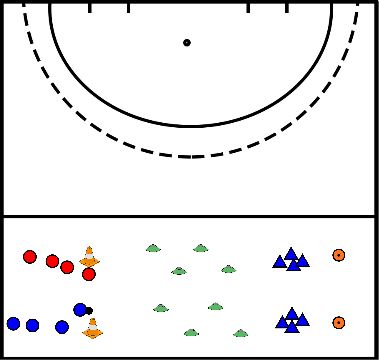Hockey drills
Three color game
- The trainer has three colors of pawns in his hand. Red, white and blue.
- Player blue A takes his turn.
- Trainer first puts color pawn 1 in the air --> For example, pawn white.
- Player blue A starts running towards the edge of the circle and receives the ball from player blue ->.
- The latter then plays the ball through the white gate as the trainer thus puts the white pawn in the air.
- Player A takes the ball through the gate and rounds on goal.
- After his shot, he takes over the spot of the player who passed the ball to him.
- The trainer puts a new color pawn in the air for the next player etc.
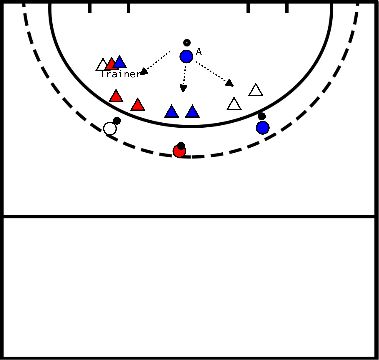
Relay 4
- Players blue and red start at the same time with the ball
- Slalom around the 5 pawns --> cross --> around the green pawn and finish on goal.
- If you score, you may immediately choose the shortest path to tap your next teammate.
- If you miss; wide, post or the ball does not reach the goal, you make a detour via the red or blue pawn/triangle.
- Players blue run back via the blue pawn and players red via the red.
- When you have been, you sit on the ground.
- The team that has all players on the ground first wins the relay.
- Depending on the number of players, you may choose to have all players take their turn twice.
- Switch sides halfway through the exercise.
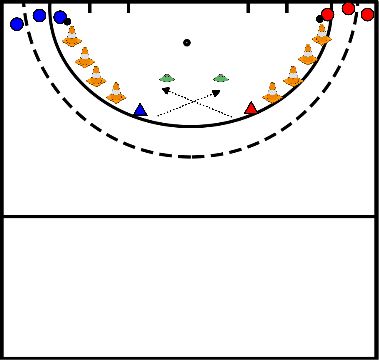
Rats versus Ravens
- Players red; the rats and players blue; the ravens all have a ball and stand with their backs to each other.
- Trainer says r(rrrr)atten: all red players drift with ball toward the pawn line; players blue leave their ball and try to tap players red for the line.
- The trainer says r(rrrr)aven: all blue players drive ball toward the pawn line; players red leave their ball and try to tap players blue for the line.
- Reach the line without being tapped, you get a point.
- Tap the player red/ blue before the line you get a point.
- Change opponents frequently.
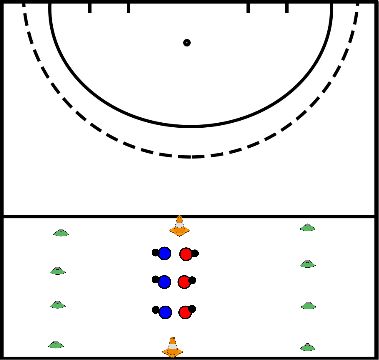
- Player blue 1 plays the ball with a controlled push or flats diagonally onto the forehand of player red 2.
- Player red 2 takes the ball on the forehand and rounds on goal.
- Player red 1 plays the ball with a controlled push or flats diagonally onto the backhand of player blue 2.
- Player blue 2 takes the ball on the backhand and rounds on goal.
Points of focus:
- The focus in this exercise is on the approach.
- Make yourself small when making the approach.
- Try to pick up the pace of the ball.
- Let the ball roll past you and take the ball as late as possible.
- Make sure that the ball does not rise when taking it on. So keep your stick straight and not angled.
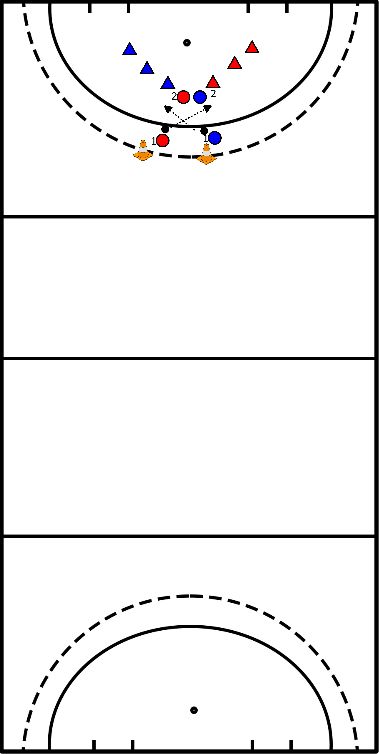
- All players start with a ball in the square and dribble/drive around in it.
- The trainer determines the moment to call stop!
- At that moment, all players make sure the ball is stopped as quickly as possible.
- Does the ball roll on. So does the player not have control of the ball he is off.
- When you are off, you wait by the side.
- The trainer may point to a waiting player to call stop!
- As a trainer, at some point you may indicate that the players should dribble faster.
- This makes it more difficult to stop the ball.
Note: the ball must be really still, so it should not roll a little bit.
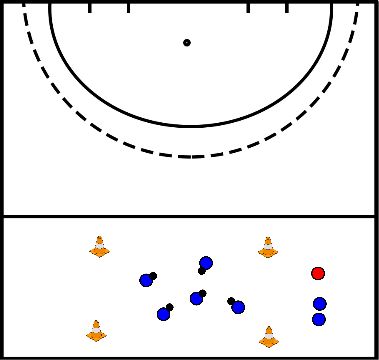
- Except for one player -red-, all players -blue- have one ball.
- The red defender tries to work all balls out of the box.
- If a blue player loses his/her ball and it has been played out of the box, she/he stands with her/his legs apart.
- The player can be redeemed by another blue player; This one plays the ball through the legs -panna- and blue has a player back in the box.
- Continue until all players are off.
Points of attention:
- If it takes too long or you notice in advance that one defender is too little, appoint an extra defender.
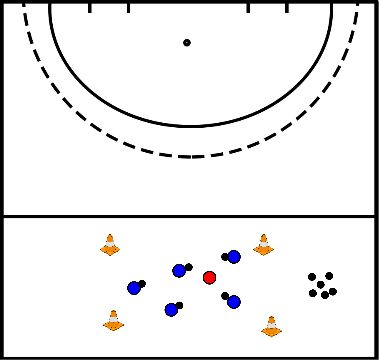
Three-color game
- Players all have a ball and dribble through the box of pawns.
- Scattered through the box are pawns of three different colors; at least 4 of each color.
- Trainer has in hand of all three colors -i.e. in the example red, blue and white.
- Trainer puts e.g. a blue pawn in the air --> All players try to drive around all blue pawns as quickly as possible.
- The first two players who have driven around all blue pawns get a point.
- Then a new round begins and the trainer chooses another color pawn -or the same color.
- Etc.
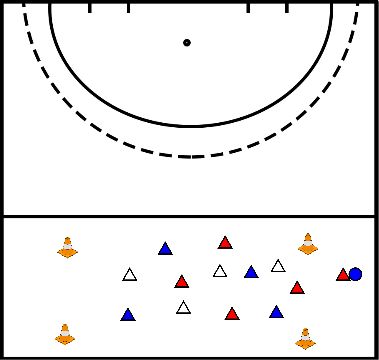
Basic techniques -> Push pass out of the run.
- The trainer makes 3-pairs -if you can't work out the numbers of 4-pairs-; 2 players on one side of the playing field, 1 on the other side.
- The side of the pair always starts with the ball.
- Player 1 starts by floating to the other side.
- Halfway across the playing field he gives a push pass to player 2 on the opposite side.
- Player 2 takes the ball and does the same as Player 1 and gives the ball with a push pass to Player 3 etc.
- The player who passed the ball first runs on to Player 2's spot, Player 2 to Player 3's spot etc.
Points of attention:
- Drive the ball well in front of your body -i.e. not next to it or behind it- -> Look well over the ball.
- Drive the ball well outside with your left elbow.
- The exercise must be performed technically well before you can increase speed.
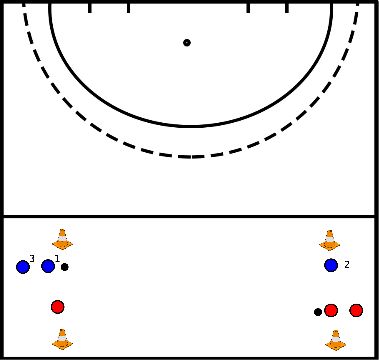
Relay
- As trainers, create two equal teams.
- Start the relay at the trainer's signal.
- The players slalom around the pawns. Both ball and body around the pawns. And rounds on goal; push or flatten.
- If the player scores, he may immediately sprint back and tap the next player.
- If the player misses, he must take a detour via the blue pawn at the side of the field and then sprint back and tap the next player.
- When it's your turn, you sit on the floor.
- Depending on the number of players, you can also choose to have all players take 2 or 3 turns.
- The next player may not start until he is tapped by the player in front of him.
- The team that has all players on the ground first wins the relay.
- There are different types of slalom to apply in this exercise:
- Normal slalom
- Slalom in which the player's body and ball are to the left or right of the pawn line
- Slalom where the ball is to the left of the row of pawns and the body is to the right
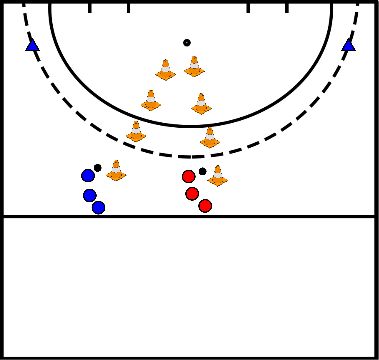
Two touches
- Player red pushes the ball to player blue, player blue to player white and player red 2. Players may touch the ball a maximum of two times.
- Player red 2 takes the ball and rounds on goal. Preferably a flat.
- After your pass, move on to the next pawn. The player who rounded on goal joins the back of the line again.
Points of attention:
- Because the player is allowed to touch the ball a maximum of two times, the ball must be right at once when taking it on. So make sure the player concentrates extra well on the takeover.
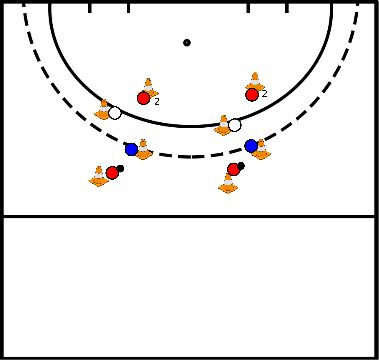
- Set out the exercises two or three times depending on the number of players.
- Make pairs and place the pawns closer and closer together.
- Players red and blue stand close together and tap the ball up and down between the pawns.
- You start with a 2-touch so assume -> pass, maximum 2 touches.
- If the ball hits a pawn, a pawn is skipped or a player touches the ball more than 2 times, you are out.
- If you are finished, start the exercise again.
- If you have made it to the end of the pawn row a number of times, try everything in 1-touch -no more than 1 touch, that is.
- Is this also successful, you can keep track of time -> Improve your record each time.
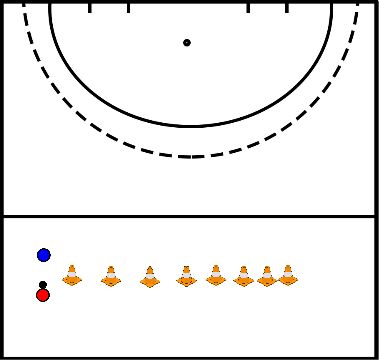
- The trainer makes two equal teams and divides them into two rows.
- The first player on each team starts with a slalom around the green pawns.
- Then he drives a lap around the blue pawns -right around.
- He puts the ball on the orange pawn and sprints back to the row of players.
- There he taps the next player.
- This one does exactly the same thing only without ball and stick.
- He picks up the ball from the cone and sprints back to the row.
- There he puts the ball ready for the next player, who travels the route again with ball and stick, and so on.
- The team that first, has all its players finish twice, is the winner of the game.
